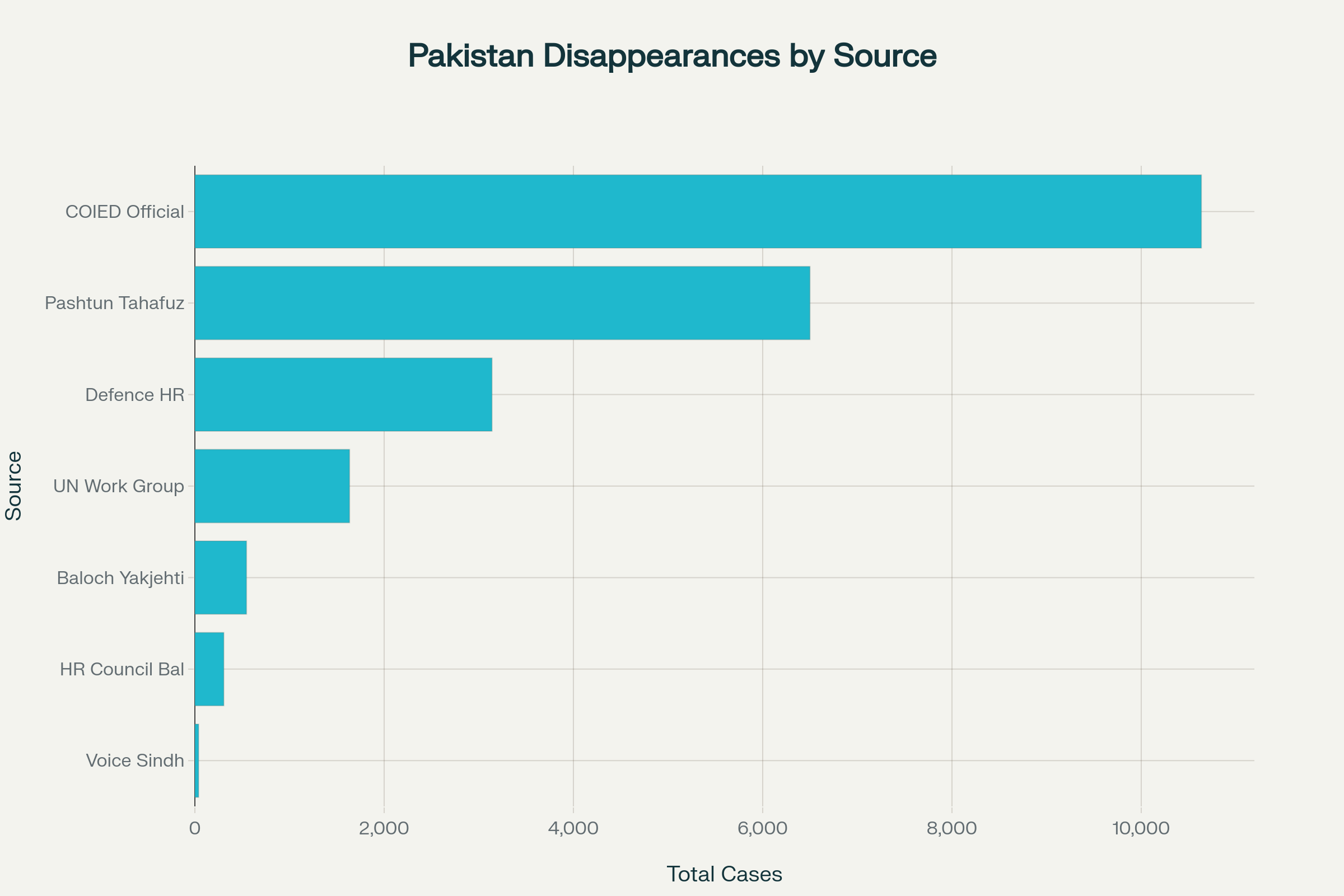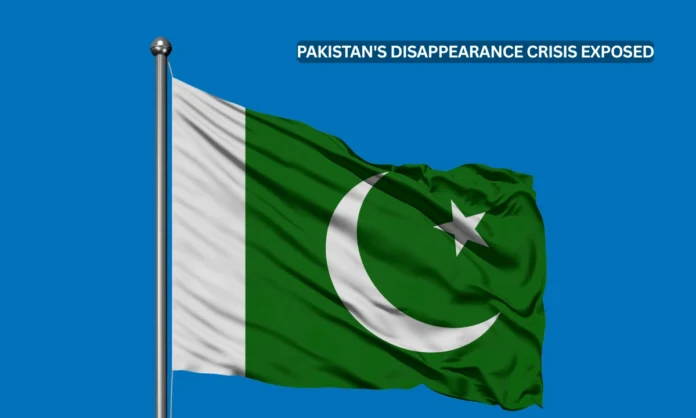Key Highlights:
- Massive Scale: Over 6,500 confirmed cases of enforced disappearances in Pakistan documented among Pashtuns alone, with thousands more cases affecting Baloch and Sindhi populations
- Government Commission Failures: Pakistan’s Commission of Inquiry on enforced disappearances in Pakistan has failed to prosecute a single perpetrator in 14 years of operation
- Recent Escalation: Human rights organizations reported 546 new Baloch cases and 40 Sindhi cases of enforced disappearances in Pakistan in just the first seven months of 2025
Enforced Disappearances in Pakistan: Crisis Overview
The Centre for Human Rights and Peace Advocacy organized a critical side event during the 60th Session of the UN Human Rights Council, titled “Enforced Disappearances in Pakistan: Amplifying Voices, Demanding Justice, Calling for Global Action”. The gathering exposed Pakistan’s systematic use of enforced disappearances as a tool to silence dissidents and human rights defenders across multiple provinces. Speakers presented compelling evidence of widespread human rights violations, describing the pattern as constituting war crimes under international law.
I raised grave concerns about the recent attack on renowned Baloch political leader Sardar Akhtar Mengal, which killed 25 innocent people, and the illegal arrests of renowned Baloch leader Dr. Mahrang Baloch and other prominent activists during a @UN side event at the 60th Human… pic.twitter.com/bbrQYOqF9a
— Dr. Tara Chand (@drtchand) October 3, 2025
Chongshi Yeah Joseph, Executive Director of the Centre for Human Rights and Peace, accused Pakistan of becoming a “rogue state” due to its alarming pattern involving extrajudicial killings, torture, and detention in unknown places. The event highlighted how these practices have become institutionalized across the country, affecting ethnic minorities including Pashtuns, Baloch, Sindhis, and Kashmiris. International experts emphasized that the crisis violates the UN Charter, Universal Declaration of Human Rights, and International Convention for the Protection of All Persons from Enforced Disappearance.
Staggering Official Statistics Reveal Crisis Scale
Pakistan’s Commission of Inquiry on Enforced Disappearances (COIED) has registered 10,636 cases of enforced disappearances in Pakistan between March 2011 and September 2025, with 1,650 cases remaining unresolved. The government commission claims to have disposed of 8,986 cases, representing an 83.56% disposal rate, though critics argue this figure masks the true extent of ongoing disappearances. According to COIED data, 4,776 individuals returned home, 706 were located in prisons, 1,017 were sent to internment centers, and 293 were found dead or extrajudicially killed.
The UN Working Group on Enforced or Involuntary Disappearances maintains significantly different statistics, with 934 outstanding cases out of 1,635 total cases transmitted since 1980. The UN body reported a 27% increase in cases during its most recent reporting period, describing this as the highest number of urgent cases transmitted in five years. Human rights organizations document far higher numbers, with the Defence of Human Rights recording 3,140 cases since 2006, of which 1,362 victims remain forcibly disappeared.
Regional data reveals the concentrated impact on ethnic minorities, with the Human Rights Council of Balochistan reporting 306 cases in just the first six months of 2024. The Baloch Yakjehti Committee documented 546 additional cases between January and July 2025, while Voice for Missing Persons of Sindh reported 40 cases during the same period. These figures demonstrate the acceleration of enforced disappearances in Pakistan, particularly targeting ethnic minority communities across the country’s provinces.

Official Statistics on Enforced Disappearances in Pakistan from Government and Human Rights Organizations
Ethnic Communities Bear Disproportionate Burden
Pashtun political activist Fazal-ur-Rehman Afridi of the Pashtun Tahafuz Movement revealed that his organization has submitted over 6,500 confirmed cases involving Pashtuns alone. The PTM documented 133 new cases in the first seven months of 2025, highlighting the ongoing targeting of Pashtun communities in Khyber Pakhtunkhwa. Afridi emphasized that the actual number is “astronomical” when combined with cases affecting Sindhi and Baloch populations, indicating systematic persecution of ethnic minorities.
The Baloch community faces particularly severe persecution, with multiple organizations documenting widespread cases across Balochistan province. Baloch activists reported that government security forces used excessive force against protesters during the July 2024 Baloch National Gathering, detaining hundreds of participants and imposing internet shutdowns in Gwadar. The targeting extends beyond individual activists to entire communities, with families and protesters subjected to surveillance, harassment, and threats by Pakistani authorities.
Sindhi activist Kamran Jatoi of the World Sindhi Congress highlighted how those opposing government projects, such as a controversial canal project on the Indus River, faced abduction and targeting. Jatoi condemned Pakistan’s misuse of anti-terrorism courts to silence peaceful activists while perpetuating enforced disappearances in Pakistan. The systematic nature of these disappearances across different ethnic groups demonstrates a coordinated state policy rather than isolated incidents.
Pakistan-Occupied Kashmir Faces Violent Crackdown
Nasir Aziz Khan, an exiled activist from PoJK and spokesperson for the United Kashmir People’s National Party, reported that Pakistani Rangers opened fire indiscriminately on peaceful protesters during September 27 demonstrations organized by the Awami Action Committee. Khan stated that more than 10 people lost their lives between September 29 and early October, with hundreds detained and tortured in Pakistani custody, adding to the pattern. The violence represents an escalation in Pakistan’s suppression of dissent in the occupied territory through extrajudicial killings.
The crackdown in PoJK reflects Pakistan’s broader strategy of using brutal force against civilians and peaceful protesters demanding basic rights, often resulting in forced disappearances. Khan accused Pakistan of exploiting PoJK’s resources since 1947 while denying fundamental rights to local populations and perpetrating enforced disappearances in Pakistan. The systematic persecution includes not only disappearances but also extrajudicial killings and mass detentions of political activists. International observers noted that Pakistan’s actions in PoJK violate multiple international legal frameworks governing occupied territories.
The situation in PoJK demonstrates how the crisis extends beyond internationally recognized borders, affecting populations in disputed territories. Human rights defenders emphasized that the international community must recognize Pakistan’s accountability for human rights violations in all territories under its control. The escalating violence in PoJK represents a critical test of international resolve to protect civilian populations from state-sponsored persecution.
Commission Failures and Culture of Impunity
Despite 14 years of operation, Pakistan’s Commission of Inquiry has failed to prosecute a single perpetrator. The International Commission of Jurists noted that this complete lack of accountability has created a climate of impunity, with authorities showing insufficient dedication to investigate cases and hold perpetrators accountable. The commission’s mandate focuses primarily on tracing whereabouts rather than establishing criminal responsibility for these serious human rights violations.
The UN Working Group on Enforced and Involuntary Disappearances concluded that Pakistan maintains a culture of entrenched impunity regarding enforced disappearances in Pakistan. Legal experts argue that the COIED’s framework fails to meet international standards for effective investigation, leaving victims and families without meaningful redress. The government’s repeated extension of the commission’s mandate without consultation with victims’ groups demonstrates a lack of genuine commitment to addressing the crisis.
International legal standards require states to promptly, thoroughly, impartially, and effectively investigate allegations and bring perpetrators to justice through fair trials. Pakistan has comprehensively failed to discharge these obligations under the International Covenant on Civil and Political Rights. The systematic failure to provide justice has further traumatized families, who receive written orders but no actual accountability for their loved ones’ disappearances.
Enforced Disappearances in Pakistan Demand Global Response
The mounting evidence presented at the UN Human Rights Council demonstrates that enforced disappearances in Pakistan constitute a systematic human rights crisis requiring immediate international intervention. With over 10,000 documented cases and multiple ethnic communities facing ongoing persecution, the scale and scope demand coordinated global action. Former Canadian MP Dr. Habib Millat, now head of the Global Center for Democratic Governance, emphasized that the situation represents a grave human rights concern requiring urgent international response.
The complete failure of Pakistan’s domestic mechanisms to provide justice or accountability underscores the need for external pressure and oversight. Human rights experts called for Pakistan’s compliance with international legal frameworks and urged the UN to fulfill its mandate of protecting peace and human rights. The systematic targeting of ethnic minorities and peaceful protesters reveals a state apparatus that prioritizes suppression over human rights, demanding immediate international sanctions and intervention to protect vulnerable populations from enforced disappearances in Pakistan.


